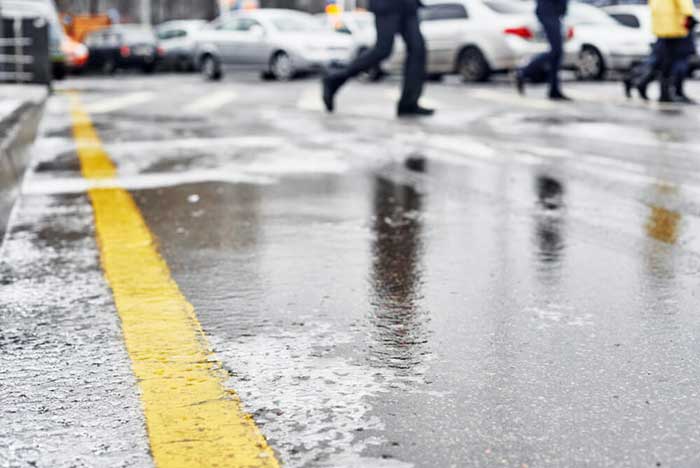Proving the City Is Liable for Your Slip and Fall on an Icy Sidewalk

Icy sidewalks are a major concern in Brooklyn around this time of year and throughout the winter season. Slip and fall injuries due to winter weather can be caused by lots of factors, including negligence on behalf of the city.
This article will describe the liability the city could encounter if you were to slip and fall on an icy patch that wasn’t properly addressed. These types of accidents can result in major injuries and often require the help of an experienced local attorney.
Legal Action for Slip and Fall Injuries Due to Ice
If your slip and fall injuries on ice occurred on a public street or sidewalk, you may be able to hold the city liable for your injuries if the city was negligent by filing a claim against the city. However, just because you fell in a public place does not mean that your injuries are the city’s fault. The city is also not automatically negligent for all falls on city property because you must prove liability to pursue this type of claim.
Proving Liability for a Slip and Fall on Icy Sidewalk
To prove liability, you must be able to show that the city was negligent for not addressing an icy area and that this negligence was the cause of your accident that resulted in injuries. It is beneficial to have evidence that the city was aware of icy street or sidewalk conditions and failed to do anything about them despite this knowledge. This evidence could be copies of letters, printouts of emails, or records of phone calls that you made to the appropriate city department to advise of the conditions prior to your accident.
It is important to remember that cities are not typically responsible for clearing away ice and snow from the areas in front of commercial businesses or private residences. However, it is the job of the city to clear ice and snow from the areas around public buildings and properties, such as public libraries, courthouses, and post offices. Public property also includes public schools, public bus stops, and park pedestrian paths. Keep in mind that many jurisdictions put an upper limit on how much a person can recover in damages from a municipality.
New Yorkers can make complaints about the public property that has not been properly cleared of snow and ice by calling 311. Meanwhile, the NYC Administrative Code requires property owners, tenants, lessees, and occupants to clean snow and ice from all sidewalks adjacent to their properties.
Common Slip and Fall Causes in the Winter and How to Avoid Them
Slip and fall accidents in the winter are usually caused because the responsible party has not cleared snow and ice off of surfaces in a timely way. You can reduce your risk of falling in the winter by monitoring weather conditions, wearing sturdy shoes with good grips, and moving especially slowly during times of adverse weather. Avoid going outside as much as possible after snow and ice storms in New York, or try wait a few hours to give the city and other property owners an opportunity to make sidewalks safe again.
After an icy slip and fall accident, make sure to take photos of the scene in case the ice melts quickly and the evidence disappears. These photos should accompany your written description of the accident and as many details and witness statements as possible. When pursuing a case against the city, it is especially important to file your claim quickly because municipal department claim deadlines are notoriously short.
Get Help With Your Case for Ice-Related Slip and Fall Injuries
If you have been involved in a winter ice-related accident and suffered slip and fall injuries, the lawyers Peters Berger Koshel & Goldberg, P.C. are here to help you. We are a Brooklyn-based law firm with experience in slip and fall injuries, and we know what it takes to bring a successful claim against the city. We’ll help you get what you deserve for compensation for the injuries you suffered because of an icy patch so that you can take care of yourself and start feeling well again.
Since slip and fall on icy sidewalk accidents have a strict statute of limitations deadline in New York, please contact us as soon as possible for a free consultation and to ask our legal team any questions you may have.
